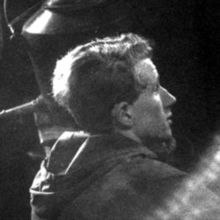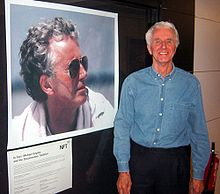- Michael Grigsby
-
Michael Grigsby (born 6 June 1936 in Reading, Berkshire) is an English documentary filmmaker.
With a filmography spanning six decades and nearly 30 films, Grigsby occupies a unique position in British documentary filmmaking, having witnessed and commented on many of the dramatic changes in British society (and beyond) from the late 1950s through to the 21st century. As a critic recently noted, “from Michael Grigsby back to John Grierson runs an unbroken tradition in British documentary-making: a passionate commitment to the poetry of everyday life.”[1]
Contents
Biography and Career
Grigsby’s passion for documentary dates back to his time at Abingdon School, an independent boarding school for boys. There, he ran the school’s film society and discovered the films of John Grierson’s documentary movement. These had an amazing impact on the 14-year-old that he was. While at school, he also talked the headmaster into funding his first attempts at documentary filmmaking. One of the films, No Tumbled House (1955), deals with the realities faced by a boy in a boarding school. On leaving Abindgon, he got his first job as a trainee assistant editor at Granada Television, in Manchester, working with the legendary Harry Watt (co-director of Nightmail). Unfortunately Watt left shortly afterwards, and Grigsby was subsequently offered a job as a studio cameraman, which by his own admission was very dull, but gave him a chance to purchase his own 16mm Bolex camera. Along with a bunch of disaffected Granada colleagues, he set up a filmmaking collective, Unit Five Seven, and spent several years shooting and editing Enginemen, a short film about work in a locomotive shed, in his spare time. By chance, the critic and filmmaker Lindsay Anderson heard of his project. Having been particularly impressed by the rushes, he and fellow filmmaker Karel Reisz helped him secure funding from the British Film Institute to complete the film, which was included in the last Free Cinema programme at the National Film Theatre (March 1959), alongside Reisz’s We Are the Lambeth Boys and Robert Vas’ Refuge England. Growing in confidence, he made another short documentary with the Unit Five Seven, Tomorrow’s Saturday (1962), about Blackburn mill workers preparing for the weekend. On the back of these two critically acclaimed shorts, he kept battering on the door at Granada and was finally allowed to direct his first documentary, Deckie Learner (1965).
His work since has shown remarkable fidelity to the concerns and principles embodied in these early films. Grigsby set out to make films about ordinary people, and those at society’s margin. He quickly gained a solid reputation as a filmmaker who – to use his own words – ‘gives a voice to the voiceless’. Thus, whether he’s filming trawlermen (Deckie Learner, 1965; A Life Apart, 1973), the survivors on both sides of the Vietnam War (I Was a Soldier, 1970; The Search, 1991; Thoi Noi, 1993), ordinary inhabitants of Northern Ireland (Too Long a Sacrifice, 1984; The Silent War, 1990; Rehearsals, 2005), families facing up to social disintegration in Thatcher’s Britain (Living on the Edge, 1987) or the traumatised Lockerbie community 10 years after the Boeing 747 disaster (Lockerbie, A Night Remembered, 1998), Grigsby does his utmost to let people speak for themselves. Hence his belief in the importance of long research periods (up to six months) prior to shooting, to gain the participants’ trust; hence also the still frames, the long meditative shots and the moments of silence, allowing people the space in which to get their points across. This unhurried pacing appears truly daring when compared to the frenetic filmic vocabulary more favoured today. Grigsby’s documentaries have also been compared to free-form jazz; he likes working instinctively, and the structure of his films generally comes to him only after he has built a real understanding of the place, the landscape and the people. His films’ inner quality also comes from the highly creative way in which he arranges sounds (often a combination of natural sounds, snatches of dialogues, archive material and live or added music) and images, thus creating symbolic contrasts between them, rather than resorting to a didactic voice-over commentary. In short, Grigsby uses eminently cinematic techniques more frequently associated with art cinema than documentary television. Although he addresses political issues (Northern Ireland, labour relations, effects of wars), there is no crude attempt in his films to ‘propagandise’. Instead, he utilises the documentary genre in a unique fashion, bringing his humanist vision to bear on problems in society, so that viewers become participants too - involved, engaged and thinking.
Influenced by Grierson’s documentary movement, emerging as part of Free Cinema, reaching maturity during documentary television’s golden age, Grigsby has today come full circle. Still as active and enthusiastic as ever despite the current lack of support for independent, imaginative documentaries in British television, amongst a number of new documentary features, he is currently working to develop his first fiction feature film. In recent years he has also returned to the place where he made his first film as a pupil, Abingdon School, to set up the AFU Abingdon Film Unit, where over thirty boys, aged 12 to 17, work together under his supervision along with several other industry professionals to make a handful of short films every year. He is as proud of this new enterprise as he is of his finest films; he sees it as his own way of passing on the torch of the great British documentary tradition to the next generation of filmmakers. The Abingdon Film Unit itself is now getting significant press, due to films such as 'Gravel & Stones', a documentary which focuses on the impact of disability on people in Cambodia, a country that, after thirty years of war, has one of the highest rates of disability in the developing world; and also One Foot on the Ground made in 2010: a 24-minute film which follows a young Moldovan basketball-player, Andreii Zelenetchii, as he struggles to keep alive his dream of playing professional in Europe’s poorest country. To date, the Unit has produced over 100 films, many of which have been screened at festivals throughout the UK and abroad, with a number winning awards along the way. Festivals include Raindance, the London International Documentary Festival and the British Film Festival in Dinard, France. Awards include Best Documentary and Best Animation at the Future Film Festival in London and the National Young Filmmaker’s Award at the Leeds Student Film Festival.
2012 will see the release of Grigsby's latest non fiction feature, 'We Went to War'. Co authored with creative producer Rebekah Tolley, the film is a follow up to Grigsby's 1970 film, 'I Was a Soldier', and returns to the stories of the same three Vietnam veterans: David, Dennis and Lamar, forty years after their return from combat to their homes in the heartlands of Texas.
References
- ^ Matthew Sweet, “Michael Grigsby: Shooting on the Edge”, The Independent, 22 June 2004
External links
- Michael Grigsby's page on Screenonline
- Interview with Michael Grigsby on the BFI's website
- Michael Grigsby's entry on the dfgdocs website
- Michael Grigsby's entry on IMDB
- Michael Grigsby's website
- Article on Michael Grigsby's current work at the Abingdon School
Selective filmography
1953: Ut Proficias
1955: No Tumbled House
1959: Enginemen
1962: Tomorrow’s Saturday
1965: Deckie Learner
1967: Death by Misadventure: SS Lusitania
1969: If the Village Dies
1969: Deep South
1970: I Was A Soldier
1971: Freshman
1972: Working the Land
1973: A Life Apart: Anxieties in a Trawling Community
1974: A life Underground
1976: The People’s Land
1979: Before the Monsoon
1981: For My Working Life
1984: Too Long a Sacrifice
1987: Living on the Edge
1990: The Silent War
1990: Dear Mr Gorbachev
1991: The Search
1993: Thoi Noi
1994: The Time of Our Lives
1994: Pictures on a Piano
1995: Hidden Voices
1996: Living with the Enemy
1998: Lockerbie, A night Remembered
1998: The Score
1999: Billion Dollar Secret
2001: Solway Harvester – Lost at Sea
2005: Rehearsals
2012: We Went to WarCategories:- 1936 births
- English documentary filmmakers
- Living people
Wikimedia Foundation. 2010.


